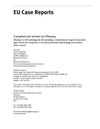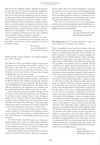14 citations,
July 2022 in “Nutrients” Vitamin A is important for healthy skin and hair, influencing hair growth and skin healing, but UV light reduces its levels.
 666 citations,
September 1977 in “British Journal of Dermatology”
666 citations,
September 1977 in “British Journal of Dermatology” Common baldness, also known as Androgenetic Alopecia, is caused by a combination of genetic factors and hormones called androgens.
January 2023 in “Springer eBooks”  17 citations,
June 2021 in “Molecules”
17 citations,
June 2021 in “Molecules” Melatonin-loaded nanocarriers improve melatonin delivery and effectiveness for various medical treatments.
 December 2020 in “Biomedical Journal of Scientific and Technical Research”
December 2020 in “Biomedical Journal of Scientific and Technical Research” Serenoa repens, a natural compound, can increase hair count and help repair capillaries, making it a promising treatment for hair loss.
 2 citations,
September 2020 in “Journal of Drug Delivery and Therapeutics”
2 citations,
September 2020 in “Journal of Drug Delivery and Therapeutics” Some plants can promote hair growth and are becoming more popular due to fewer side effects.
 July 2023 in “International journal of pharmacognosy and life science”
July 2023 in “International journal of pharmacognosy and life science” The herbal hair oil made from various plants might be a good alternative to synthetic hair loss treatments.
 July 2007 in “Journal of Generic Medicines”
July 2007 in “Journal of Generic Medicines” The UK High Court revoked Lundbeck's patent for Escitalopram, and second medical use claims based on dosage were not considered novel.
 39 citations,
April 2007 in “Therapeutic Drug Monitoring”
39 citations,
April 2007 in “Therapeutic Drug Monitoring” Finasteride affects urinary steroid profiles and can potentially hide steroid abuse in sports drug testing.
 22 citations,
April 2006 in “Journal of Dermatological Science”
22 citations,
April 2006 in “Journal of Dermatological Science” Vitamin C derivative increases versican in cells, potentially aiding hair growth.
 January 2016 in “Georg Thieme Verlag eBooks”
January 2016 in “Georg Thieme Verlag eBooks” More East Asians are accepting and getting facial plastic surgery, with a focus on natural-looking results and using both surgical and nonsurgical methods.
 July 1996 in “International Journal of Dermatology”
July 1996 in “International Journal of Dermatology” The book "Hair Replacement" is a detailed guide on all methods of hair replacement, recommended for those interested in the field.
 27 citations,
January 2018 in “Curēus”
27 citations,
January 2018 in “Curēus” Subcutaneous contraceptives can cause side effects like menstrual changes, headaches, weight gain, and pain at the implant site.
 26 citations,
June 2011 in “International Journal of Pharmaceutics”
26 citations,
June 2011 in “International Journal of Pharmaceutics” SLN suspensions work as well as commercial solutions for minoxidil delivery, but are non-corrosive, making them a promising alternative.
114 citations,
October 1996 in “Dermatologic clinics” Hair loss is mainly caused by hormones, autoimmune issues, and chemotherapy, and needs more research for treatments.
 24 citations,
January 2003 in “Journal of Investigative Dermatology”
24 citations,
January 2003 in “Journal of Investigative Dermatology” Blocking a specific receptor slows down hair loss in mice.
December 2024 in “International Journal of Scientific Reports” The plant-based hair serum is a promising and safe alternative to minoxidil for hair regrowth.
 6 citations,
May 2022 in “Frontiers in Microbiology”
6 citations,
May 2022 in “Frontiers in Microbiology” Marine microbes could be used in cosmetics for sun protection, skin care, and possibly preventing hair loss.
 2 citations,
October 2015 in “Human Gene Therapy”
2 citations,
October 2015 in “Human Gene Therapy” The congress highlighted new gene therapy techniques and cell transplantation methods for treating diseases.
 22 citations,
August 2017 in “Stem cells and cloning”
22 citations,
August 2017 in “Stem cells and cloning” Stem cell technologies and regenerative medicine, including platelet-rich plasma, show promise for hair restoration in treating hair loss, but more research is needed.
 April 2019 in “Journal of Investigative Dermatology”
April 2019 in “Journal of Investigative Dermatology” Researchers fixed gene mutations causing a skin disease in stem cells, which then improved skin grafts in mice.
 10 citations,
January 1977 in “Archives of Dermatology”
10 citations,
January 1977 in “Archives of Dermatology” Androgenetic Alopecia is commonly known as male or female pattern baldness.
August 2021 in “Annales pharmaceutiques françaises” Topical finasteride at 0.25% is effective and has fewer side effects than oral finasteride for hair loss.
 November 2015 in “Springer eBooks”
November 2015 in “Springer eBooks” Hair loss treated with minoxidil, finasteride, laser/light, hair transplant, and scalp prostheses; more research needed for skin of color.
 33 citations,
September 2017 in “Molecules”
33 citations,
September 2017 in “Molecules” Red ginseng oil and its components help promote hair regrowth and could treat hair loss.
 1 citations,
January 2017 in “Elsevier eBooks”
1 citations,
January 2017 in “Elsevier eBooks” The document concludes that new treatments for hair loss may involve a combination of cosmetics, clinical methods, and genetic approaches.
 88 citations,
April 2017 in “Journal of Pediatric and Adolescent Gynecology”
88 citations,
April 2017 in “Journal of Pediatric and Adolescent Gynecology” The document concludes that early diagnosis and treatment of Congenital Adrenal Hyperplasia are crucial for preventing serious health issues and improving patient outcomes.
 31 citations,
September 2009 in “Natural Product Research”
31 citations,
September 2009 in “Natural Product Research” Citrullus colocynthis fruit extract may effectively treat testosterone-related hair loss, similar to finasteride.
 7 citations,
January 1992 in “Adolescent and pediatric gynecology”
7 citations,
January 1992 in “Adolescent and pediatric gynecology” Early diagnosis and treatment of PCOS in teenagers can help prevent more severe adult PCOS.
 2 citations,
January 2018 in “Dermatology Review/Przegląd Dermatologiczny”
2 citations,
January 2018 in “Dermatology Review/Przegląd Dermatologiczny” Use trichoscopy to diagnose hair loss; treat with minoxidil, finasteride, or dutasteride; consider platelet-rich plasma and spironolactone.
























